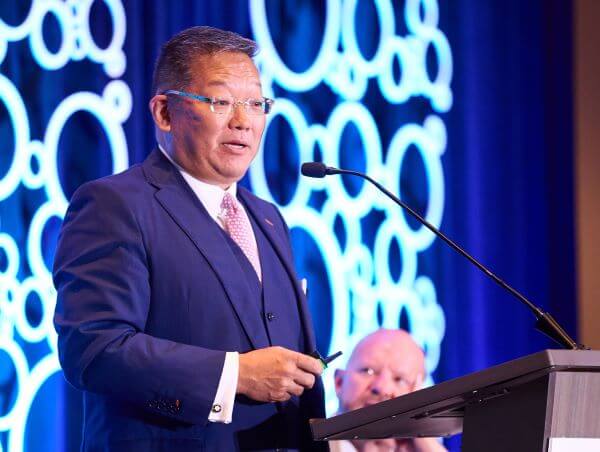
Attendees of Texas Medical Association’s second Business of Medicine Conference heard a host of economic hurdles to physicians, but underscoring them all is the decades-long trend of decreasing Medicare physician payment, according to the American Medical Association’s Board of Trustees Chair Michael Suk, MD.
The conference opened Oct. 11 with remarks from TMA President G. Ray Callas, MD, whose travel across the state has afforded him renewed insight into his fellow physicians’ struggles. Medicare cuts are chief among them, he says.
“Every time you give a cut, you’re ruining the practice of medicine,” he said before introducing Dr. Suk. “The citizens of the United States deserve better. They paid into the program – why shouldn’t they have physician-led care?”
Medicare payment decreases not only drive physicians to change or close their independent practices, but also create ripple effects on other threats to medicine, Dr. Suk says. For instance, the increased pressure on physicians opens the door to proponents of scope-of-practice expansions by nonphysician practitioners.
“As we get [decreased] value in terms of what the government pays us, it’s easy to begin to look to a lesser-paid employee to do exactly what you’re trying to do,” he said to conference attendees.
This phenomenon applies equally to the over 70% of U.S. physicians in employed settings, such as himself, he added: “When that value goes down, my power, my ability to have a voice, goes down to the same level.”
In the 2023 Texas legislative session, TMA succeeded in a total block-out of scope expansion bills, a feat Dr. Suk called “unbelievable.” Now, he calls on Texas physicians to use the same powerful advocacy to join AMA in its full-court press to pass House Resolution 2474, a bill which would permanently tie payment updates to the Medicare Economic Index.
“This is the one [piece of federal legislation] we have to rally around,” he said. “If we get this one, next year, we won’t say stop the cut. We’ll talk about other things.”
Dr. Suk acknowledges that there’s no shortage of other things to discuss but says prioritizing the Medicare fix is the best path to addressing them.
“As we talk about the ecosystem of health care and the economic forces that affect us, we often get lost in an investment here, an issue there, and we lose sight of the real picture. But what’s happening now is we’re starting to laser focus on one single thing. One of the things within this is the ability to attach our data [and payment] to a national inflationary investment.”
AMA’s “laser focus” on fixing Medicare payment with HR 2474 came partially out of a work group with TMA involvement. San Antonio pathologist David Henkes, MD, chair of the Texas Delegation to the AMA, encourages fellow Texas physicians to take advantage of opportunities to collaborate with the national organization.
“We’re all in this to enhance and preserve our profession,” he said to attendees after Dr. Suk’s presentation. AMA policy allows for one delegate per 1,000 state medical association members who join AMA, which could total 57 delegates for Texas. Currently, the delegation stands at 20 members.
As part of his visit to the Business of Medicine Conference, Dr. Suk also celebrated Texas physicians involved in the AMA, thanking Sue Bailey, MD, 175th president of the association, for her mentorship, and presenting AMA’s Distinguished Service Award to Kenneth Mattox, MD, a thoracic surgeon at Ben Taub Hospital in Houston. He was also honored by TMA with the Laurance N. Nickey, MD, Lifetime Achievement Award this January.
“It is amazing to shake hands with a man who’s touched the hands of every surgeon in the country,” Dr. Suk said, citing Dr. Mattox’s pioneering work on Trauma, a medical textbook now in its ninth edition.
“The [AMA Distinguished Service Award] only tells me to redouble my efforts in quality of medicine, education of medicine, and development of new knowledge as we reach out to find a better way and give that better way to our patients,” Dr. Mattox said upon receiving the honor.